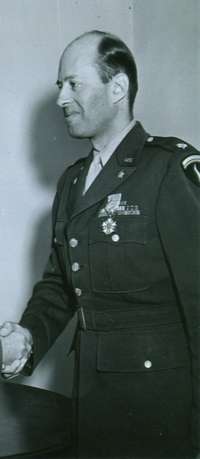L. Bancel LaFarge

L. Bancel LaFarge (1900-1989) was an American architect. He was a founding member of the New York City Landmarks Preservation Commission.[1]
Early life and education
Louis Bancel LaFarge was born into a prominent American family. His grandfather, John LaFarge, was a noted American artist. His grandmother was a granddaughter of Commodore Oliver Hazard Perry and a direct descendant of Benjamin Franklin.[2] His father, Bancel LaFarge, was an artist who continued his father's work in glass,[3][4] and his brother Tom was a mural painter.[5]
LaFarge was a graduate of Harvard College and the Yale School of Architecture.[3] He married Margaret Hockaday, with whom he had three children: Timothy, Benjamin, and Celestine.
Career
LaFarge established himself as an architect in New York specializing in domestic architecture. His practice was interrupted by military service in the Second World War. At war's end, he returned to his work as an architect. At one time he served as president of the New York chapter of the American Institute of Architects (1958-1960), and he was a founding member of the New York City Landmarks Preservation Commission (1965–70).[1]
World War II
Major LaFarge was assigned to the 7th Army in Europe during the Second World War. He was the Chief of the Monuments, Fine Arts, and Archives (MFAA) section. LaFarge was the first MFAA officer to arrive in France after D-Day in 1944.[3]
See also
- Roberts Commission
- Nazi Plunder
- Rescuing Da Vinci
- The Rape of Europa
- Monuments, Fine Arts, and Archives program
- Monuments Men Foundation for the Preservation of Art
Notes
- 1 2 Flint, Peter B. "L. B. La Farge, 89, an Architect," New York Times. July 4, 1989.
- ↑ "Religion: Reasoned Optimist," Time. March 3, 1952.
- 1 2 3 Monuments Men Foundation: Monuments Men LaFarge, Maj. L. Bancel]
- ↑ Time. March 3, 1952.
- ↑ Clarke, T. Emigrés in the Wilderness. New York: Macmilland, 1941, p. 178.
References
- American Commission for the Protection and Salvage of Artistic and Historic Monuments in War Areas. (1946). Report. Washington, D.C.: U.S. Government Printing Office. OCLC 185537904
- Nicholas, Lynn H. (1995). The Rape of Europa: The Fate of Europe’s Teasures in the Third Reich and the Second World War. New York: Vintage Books. ISBN 978-0-679-75686-6; OCLC 32531154
Archival resources
- Charles Maurice Fleischner papers, Yale University Library, Manuscripts and Archives
- LaFarge Family Papers, Yale University Library
External links
- PBS (Oregon Public Broadcasting): "The Rape of Europa.", 2006 film, aired November 24, 2008
- Monuments Men Foundation: Monuments Men> LaFarge, Maj. L. Bancel
- Obituary: Flint, Peter B. "L. B. La Farge, 89, an Architect," New York Times. July 4, 1989.